Development and Impacts of Contemporary Tourism: An Economic View
VerifiedAdded on 2023/06/08
|7
|2141
|381
Essay
AI Summary
This essay provides a comprehensive analysis of the tourism sector, focusing on the factors that have contributed to the development of contemporary tourism, including improvements in transportation, climate, religious factors, cultural and historical aspects, organizational collaborations, and technology. It examines the positive and negative economic impacts, such as job creation, GDP growth, inflation, and seasonal employment. Furthermore, the essay discusses the environmental impacts, including conservation practices, pollution, and over-utilization of natural resources. It also explores the socio-cultural impacts, highlighting increased interaction, preservation of culture, and potential negative effects on local customs. The essay concludes by emphasizing the importance of addressing current issues in tourism to maximize its contribution to the economy and mitigate its adverse effects, especially in the post-pandemic era, recommending strong policies and strategies for sustainable tourism development.
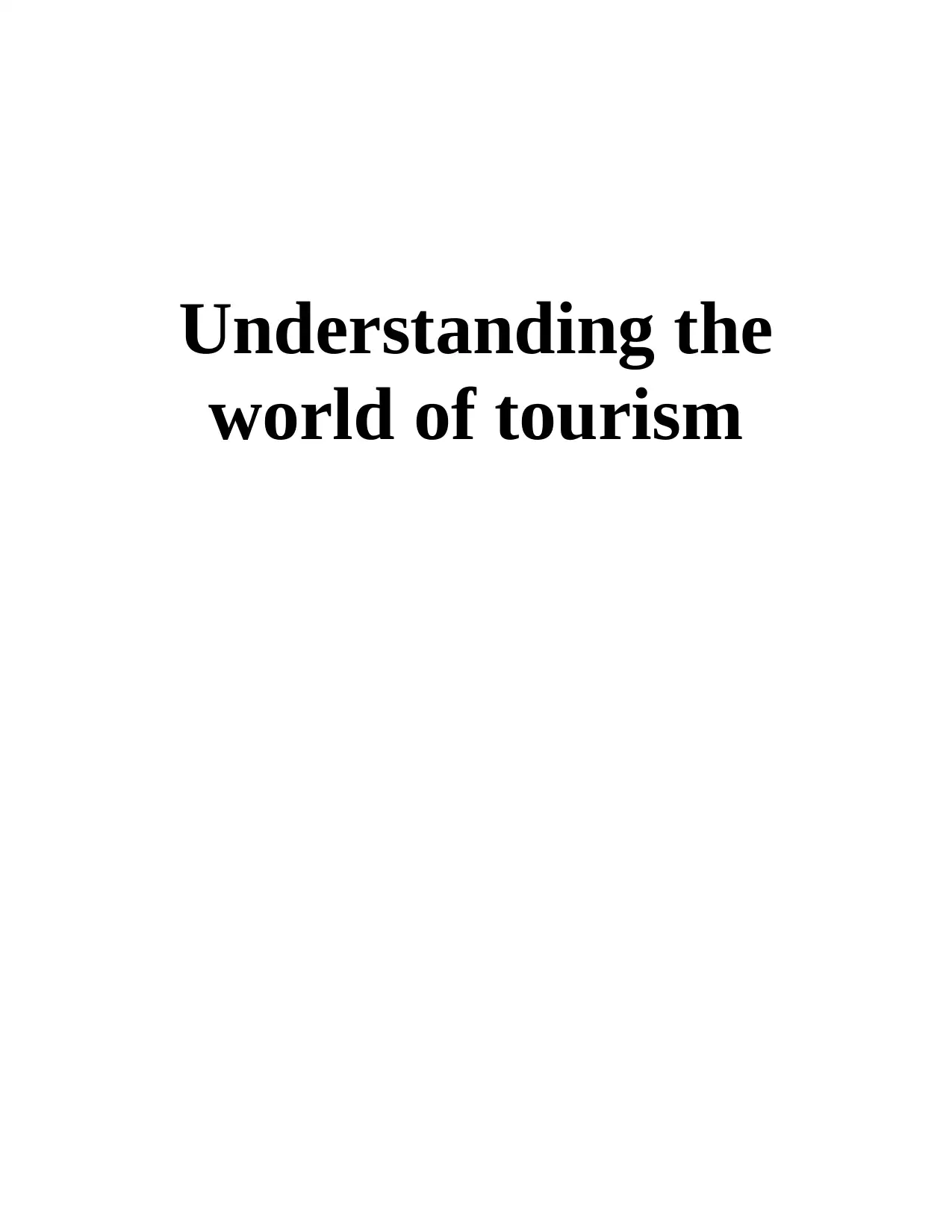
Understanding the
world of tourism
world of tourism
Paraphrase This Document
Need a fresh take? Get an instant paraphrase of this document with our AI Paraphraser
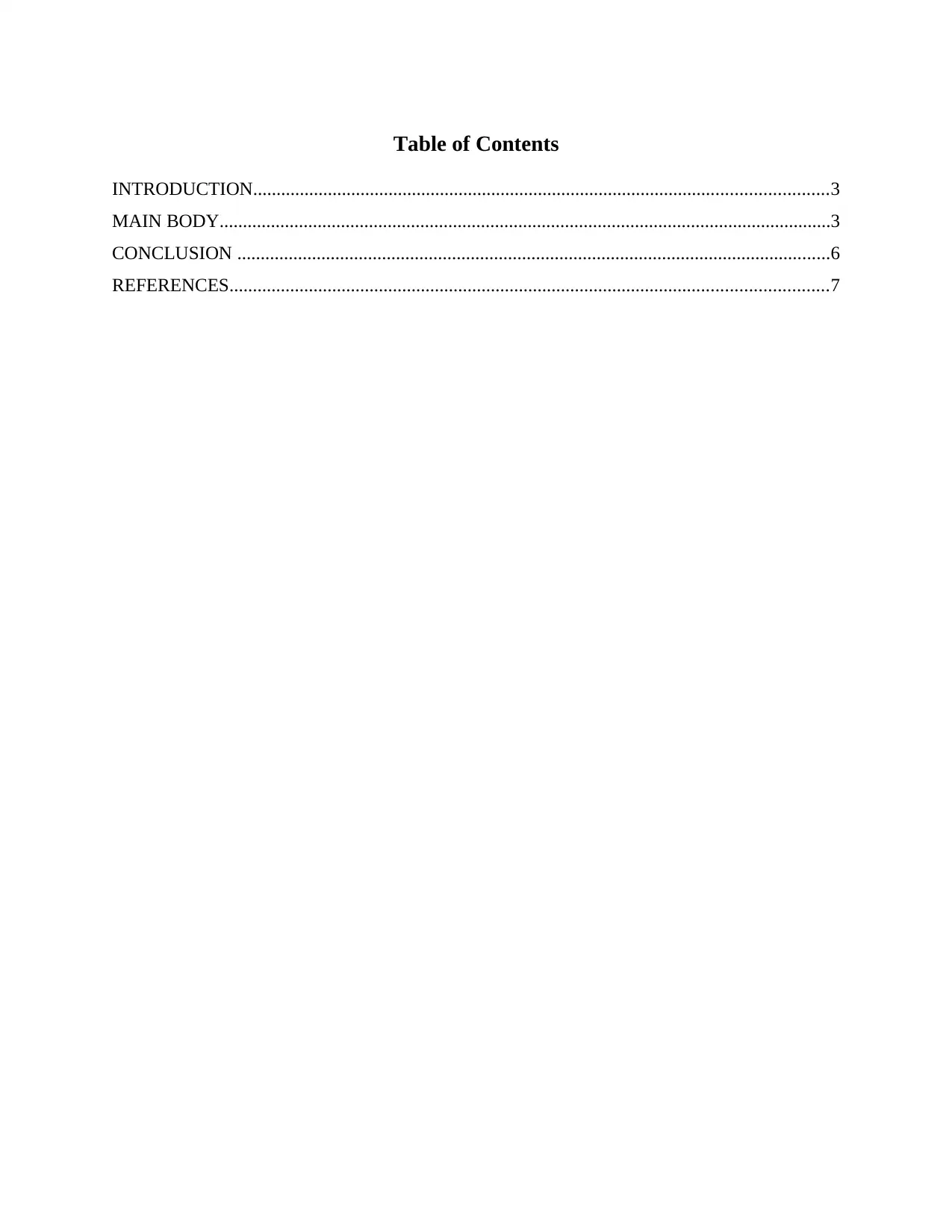
Table of Contents
INTRODUCTION...........................................................................................................................3
MAIN BODY...................................................................................................................................3
CONCLUSION ...............................................................................................................................6
REFERENCES................................................................................................................................7
INTRODUCTION...........................................................................................................................3
MAIN BODY...................................................................................................................................3
CONCLUSION ...............................................................................................................................6
REFERENCES................................................................................................................................7
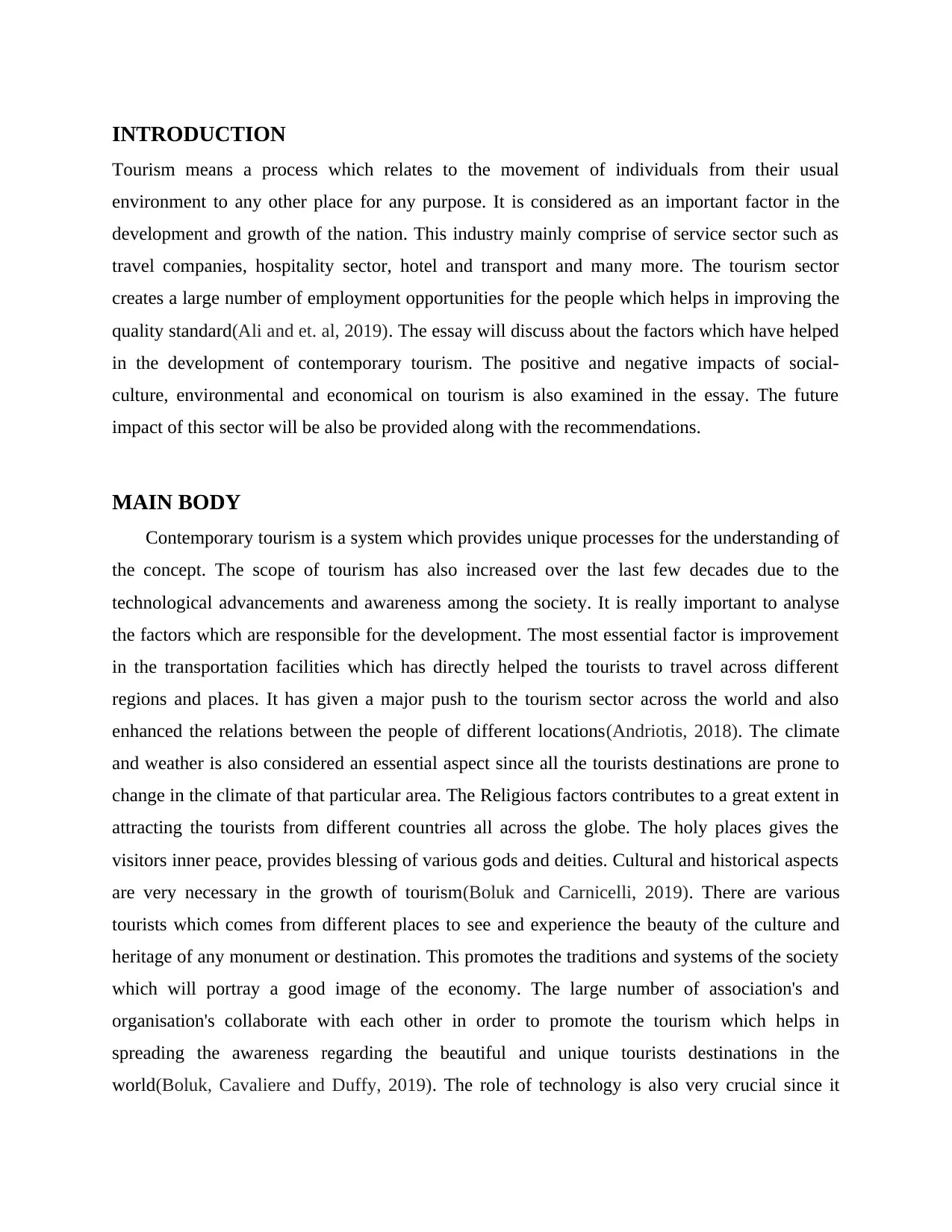
INTRODUCTION
Tourism means a process which relates to the movement of individuals from their usual
environment to any other place for any purpose. It is considered as an important factor in the
development and growth of the nation. This industry mainly comprise of service sector such as
travel companies, hospitality sector, hotel and transport and many more. The tourism sector
creates a large number of employment opportunities for the people which helps in improving the
quality standard(Ali and et. al, 2019). The essay will discuss about the factors which have helped
in the development of contemporary tourism. The positive and negative impacts of social-
culture, environmental and economical on tourism is also examined in the essay. The future
impact of this sector will be also be provided along with the recommendations.
MAIN BODY
Contemporary tourism is a system which provides unique processes for the understanding of
the concept. The scope of tourism has also increased over the last few decades due to the
technological advancements and awareness among the society. It is really important to analyse
the factors which are responsible for the development. The most essential factor is improvement
in the transportation facilities which has directly helped the tourists to travel across different
regions and places. It has given a major push to the tourism sector across the world and also
enhanced the relations between the people of different locations(Andriotis, 2018). The climate
and weather is also considered an essential aspect since all the tourists destinations are prone to
change in the climate of that particular area. The Religious factors contributes to a great extent in
attracting the tourists from different countries all across the globe. The holy places gives the
visitors inner peace, provides blessing of various gods and deities. Cultural and historical aspects
are very necessary in the growth of tourism(Boluk and Carnicelli, 2019). There are various
tourists which comes from different places to see and experience the beauty of the culture and
heritage of any monument or destination. This promotes the traditions and systems of the society
which will portray a good image of the economy. The large number of association's and
organisation's collaborate with each other in order to promote the tourism which helps in
spreading the awareness regarding the beautiful and unique tourists destinations in the
world(Boluk, Cavaliere and Duffy, 2019). The role of technology is also very crucial since it
Tourism means a process which relates to the movement of individuals from their usual
environment to any other place for any purpose. It is considered as an important factor in the
development and growth of the nation. This industry mainly comprise of service sector such as
travel companies, hospitality sector, hotel and transport and many more. The tourism sector
creates a large number of employment opportunities for the people which helps in improving the
quality standard(Ali and et. al, 2019). The essay will discuss about the factors which have helped
in the development of contemporary tourism. The positive and negative impacts of social-
culture, environmental and economical on tourism is also examined in the essay. The future
impact of this sector will be also be provided along with the recommendations.
MAIN BODY
Contemporary tourism is a system which provides unique processes for the understanding of
the concept. The scope of tourism has also increased over the last few decades due to the
technological advancements and awareness among the society. It is really important to analyse
the factors which are responsible for the development. The most essential factor is improvement
in the transportation facilities which has directly helped the tourists to travel across different
regions and places. It has given a major push to the tourism sector across the world and also
enhanced the relations between the people of different locations(Andriotis, 2018). The climate
and weather is also considered an essential aspect since all the tourists destinations are prone to
change in the climate of that particular area. The Religious factors contributes to a great extent in
attracting the tourists from different countries all across the globe. The holy places gives the
visitors inner peace, provides blessing of various gods and deities. Cultural and historical aspects
are very necessary in the growth of tourism(Boluk and Carnicelli, 2019). There are various
tourists which comes from different places to see and experience the beauty of the culture and
heritage of any monument or destination. This promotes the traditions and systems of the society
which will portray a good image of the economy. The large number of association's and
organisation's collaborate with each other in order to promote the tourism which helps in
spreading the awareness regarding the beautiful and unique tourists destinations in the
world(Boluk, Cavaliere and Duffy, 2019). The role of technology is also very crucial since it
⊘ This is a preview!⊘
Do you want full access?
Subscribe today to unlock all pages.

Trusted by 1+ million students worldwide
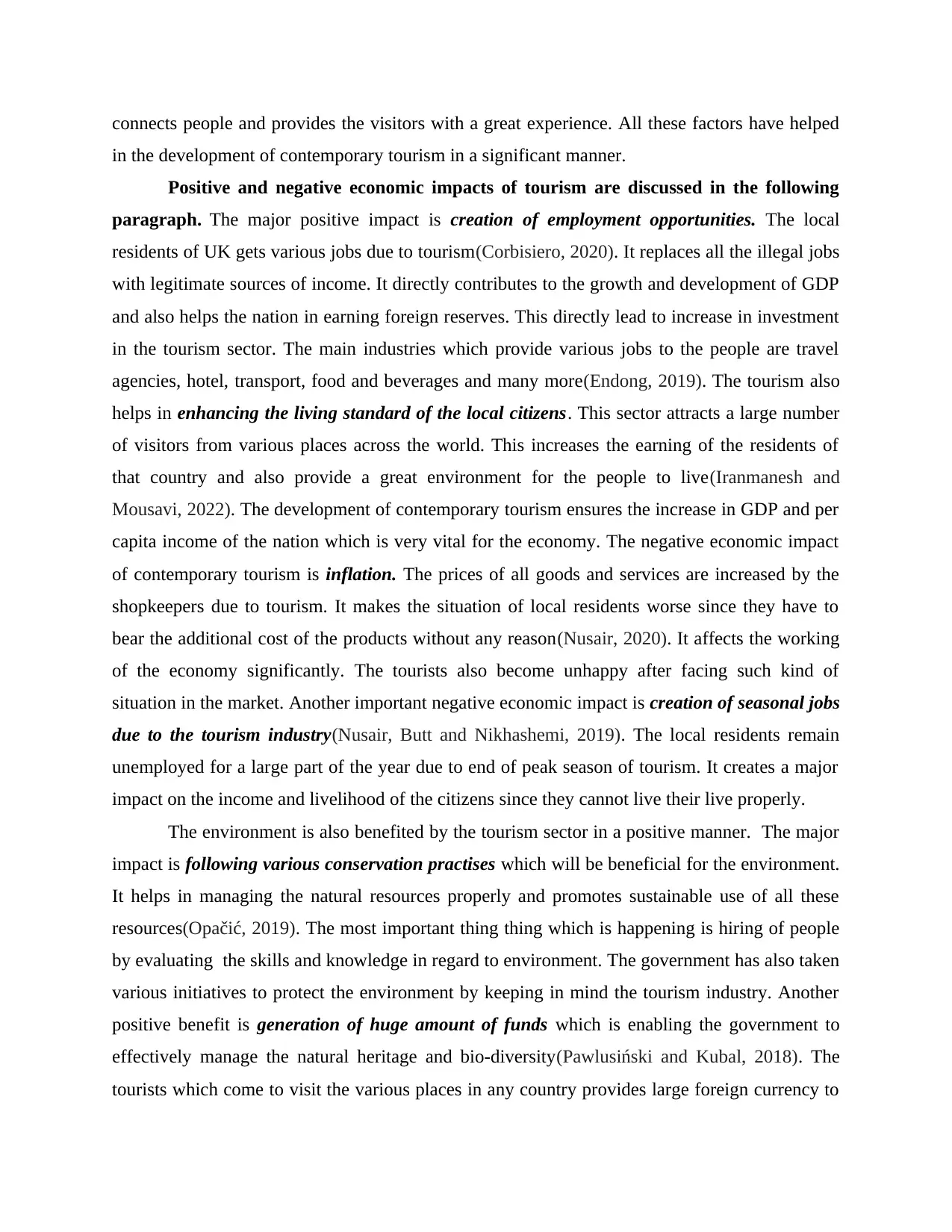
connects people and provides the visitors with a great experience. All these factors have helped
in the development of contemporary tourism in a significant manner.
Positive and negative economic impacts of tourism are discussed in the following
paragraph. The major positive impact is creation of employment opportunities. The local
residents of UK gets various jobs due to tourism(Corbisiero, 2020). It replaces all the illegal jobs
with legitimate sources of income. It directly contributes to the growth and development of GDP
and also helps the nation in earning foreign reserves. This directly lead to increase in investment
in the tourism sector. The main industries which provide various jobs to the people are travel
agencies, hotel, transport, food and beverages and many more(Endong, 2019). The tourism also
helps in enhancing the living standard of the local citizens. This sector attracts a large number
of visitors from various places across the world. This increases the earning of the residents of
that country and also provide a great environment for the people to live(Iranmanesh and
Mousavi, 2022). The development of contemporary tourism ensures the increase in GDP and per
capita income of the nation which is very vital for the economy. The negative economic impact
of contemporary tourism is inflation. The prices of all goods and services are increased by the
shopkeepers due to tourism. It makes the situation of local residents worse since they have to
bear the additional cost of the products without any reason(Nusair, 2020). It affects the working
of the economy significantly. The tourists also become unhappy after facing such kind of
situation in the market. Another important negative economic impact is creation of seasonal jobs
due to the tourism industry(Nusair, Butt and Nikhashemi, 2019). The local residents remain
unemployed for a large part of the year due to end of peak season of tourism. It creates a major
impact on the income and livelihood of the citizens since they cannot live their live properly.
The environment is also benefited by the tourism sector in a positive manner. The major
impact is following various conservation practises which will be beneficial for the environment.
It helps in managing the natural resources properly and promotes sustainable use of all these
resources(Opačić, 2019). The most important thing thing which is happening is hiring of people
by evaluating the skills and knowledge in regard to environment. The government has also taken
various initiatives to protect the environment by keeping in mind the tourism industry. Another
positive benefit is generation of huge amount of funds which is enabling the government to
effectively manage the natural heritage and bio-diversity(Pawlusiński and Kubal, 2018). The
tourists which come to visit the various places in any country provides large foreign currency to
in the development of contemporary tourism in a significant manner.
Positive and negative economic impacts of tourism are discussed in the following
paragraph. The major positive impact is creation of employment opportunities. The local
residents of UK gets various jobs due to tourism(Corbisiero, 2020). It replaces all the illegal jobs
with legitimate sources of income. It directly contributes to the growth and development of GDP
and also helps the nation in earning foreign reserves. This directly lead to increase in investment
in the tourism sector. The main industries which provide various jobs to the people are travel
agencies, hotel, transport, food and beverages and many more(Endong, 2019). The tourism also
helps in enhancing the living standard of the local citizens. This sector attracts a large number
of visitors from various places across the world. This increases the earning of the residents of
that country and also provide a great environment for the people to live(Iranmanesh and
Mousavi, 2022). The development of contemporary tourism ensures the increase in GDP and per
capita income of the nation which is very vital for the economy. The negative economic impact
of contemporary tourism is inflation. The prices of all goods and services are increased by the
shopkeepers due to tourism. It makes the situation of local residents worse since they have to
bear the additional cost of the products without any reason(Nusair, 2020). It affects the working
of the economy significantly. The tourists also become unhappy after facing such kind of
situation in the market. Another important negative economic impact is creation of seasonal jobs
due to the tourism industry(Nusair, Butt and Nikhashemi, 2019). The local residents remain
unemployed for a large part of the year due to end of peak season of tourism. It creates a major
impact on the income and livelihood of the citizens since they cannot live their live properly.
The environment is also benefited by the tourism sector in a positive manner. The major
impact is following various conservation practises which will be beneficial for the environment.
It helps in managing the natural resources properly and promotes sustainable use of all these
resources(Opačić, 2019). The most important thing thing which is happening is hiring of people
by evaluating the skills and knowledge in regard to environment. The government has also taken
various initiatives to protect the environment by keeping in mind the tourism industry. Another
positive benefit is generation of huge amount of funds which is enabling the government to
effectively manage the natural heritage and bio-diversity(Pawlusiński and Kubal, 2018). The
tourists which come to visit the various places in any country provides large foreign currency to
Paraphrase This Document
Need a fresh take? Get an instant paraphrase of this document with our AI Paraphraser
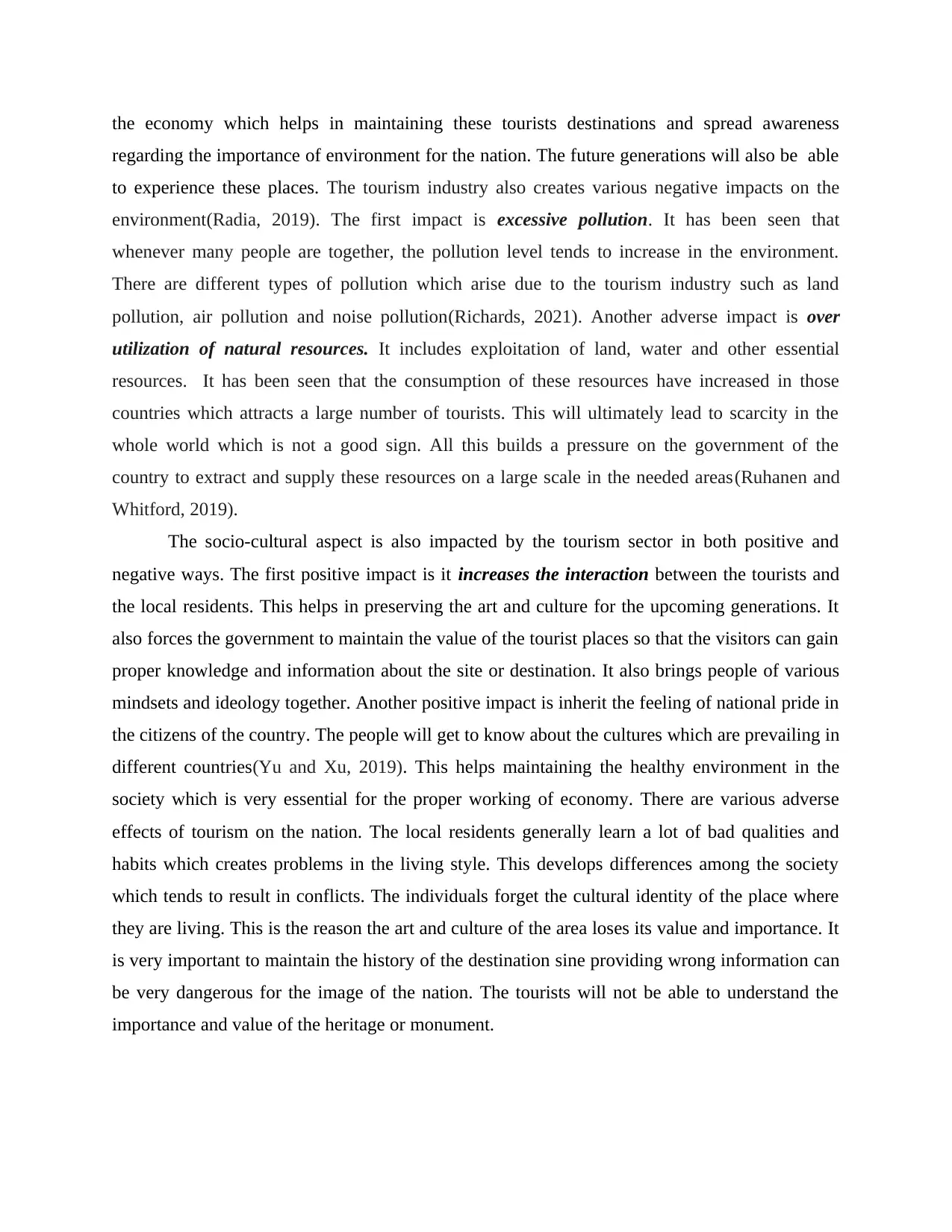
the economy which helps in maintaining these tourists destinations and spread awareness
regarding the importance of environment for the nation. The future generations will also be able
to experience these places. The tourism industry also creates various negative impacts on the
environment(Radia, 2019). The first impact is excessive pollution. It has been seen that
whenever many people are together, the pollution level tends to increase in the environment.
There are different types of pollution which arise due to the tourism industry such as land
pollution, air pollution and noise pollution(Richards, 2021). Another adverse impact is over
utilization of natural resources. It includes exploitation of land, water and other essential
resources. It has been seen that the consumption of these resources have increased in those
countries which attracts a large number of tourists. This will ultimately lead to scarcity in the
whole world which is not a good sign. All this builds a pressure on the government of the
country to extract and supply these resources on a large scale in the needed areas(Ruhanen and
Whitford, 2019).
The socio-cultural aspect is also impacted by the tourism sector in both positive and
negative ways. The first positive impact is it increases the interaction between the tourists and
the local residents. This helps in preserving the art and culture for the upcoming generations. It
also forces the government to maintain the value of the tourist places so that the visitors can gain
proper knowledge and information about the site or destination. It also brings people of various
mindsets and ideology together. Another positive impact is inherit the feeling of national pride in
the citizens of the country. The people will get to know about the cultures which are prevailing in
different countries(Yu and Xu, 2019). This helps maintaining the healthy environment in the
society which is very essential for the proper working of economy. There are various adverse
effects of tourism on the nation. The local residents generally learn a lot of bad qualities and
habits which creates problems in the living style. This develops differences among the society
which tends to result in conflicts. The individuals forget the cultural identity of the place where
they are living. This is the reason the art and culture of the area loses its value and importance. It
is very important to maintain the history of the destination sine providing wrong information can
be very dangerous for the image of the nation. The tourists will not be able to understand the
importance and value of the heritage or monument.
regarding the importance of environment for the nation. The future generations will also be able
to experience these places. The tourism industry also creates various negative impacts on the
environment(Radia, 2019). The first impact is excessive pollution. It has been seen that
whenever many people are together, the pollution level tends to increase in the environment.
There are different types of pollution which arise due to the tourism industry such as land
pollution, air pollution and noise pollution(Richards, 2021). Another adverse impact is over
utilization of natural resources. It includes exploitation of land, water and other essential
resources. It has been seen that the consumption of these resources have increased in those
countries which attracts a large number of tourists. This will ultimately lead to scarcity in the
whole world which is not a good sign. All this builds a pressure on the government of the
country to extract and supply these resources on a large scale in the needed areas(Ruhanen and
Whitford, 2019).
The socio-cultural aspect is also impacted by the tourism sector in both positive and
negative ways. The first positive impact is it increases the interaction between the tourists and
the local residents. This helps in preserving the art and culture for the upcoming generations. It
also forces the government to maintain the value of the tourist places so that the visitors can gain
proper knowledge and information about the site or destination. It also brings people of various
mindsets and ideology together. Another positive impact is inherit the feeling of national pride in
the citizens of the country. The people will get to know about the cultures which are prevailing in
different countries(Yu and Xu, 2019). This helps maintaining the healthy environment in the
society which is very essential for the proper working of economy. There are various adverse
effects of tourism on the nation. The local residents generally learn a lot of bad qualities and
habits which creates problems in the living style. This develops differences among the society
which tends to result in conflicts. The individuals forget the cultural identity of the place where
they are living. This is the reason the art and culture of the area loses its value and importance. It
is very important to maintain the history of the destination sine providing wrong information can
be very dangerous for the image of the nation. The tourists will not be able to understand the
importance and value of the heritage or monument.
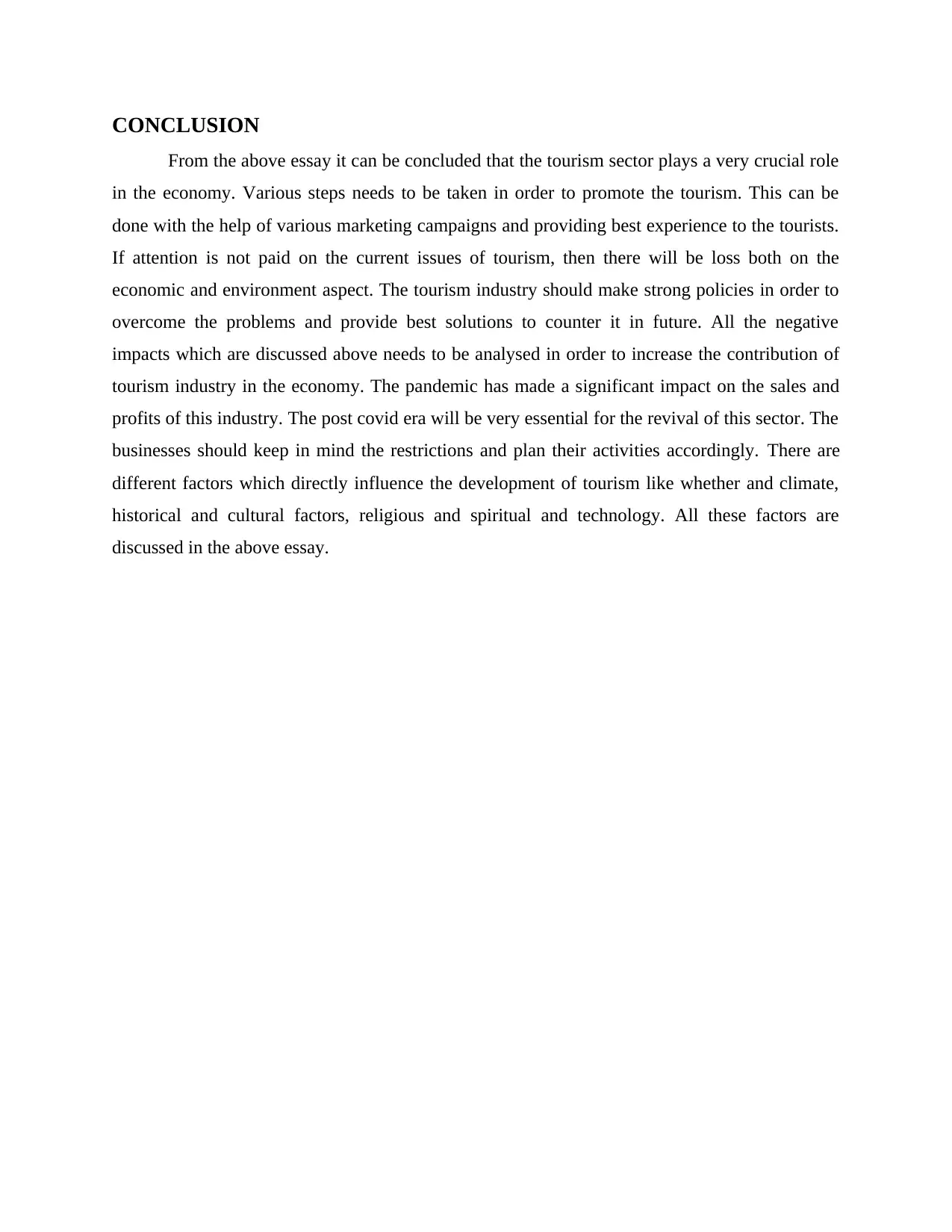
CONCLUSION
From the above essay it can be concluded that the tourism sector plays a very crucial role
in the economy. Various steps needs to be taken in order to promote the tourism. This can be
done with the help of various marketing campaigns and providing best experience to the tourists.
If attention is not paid on the current issues of tourism, then there will be loss both on the
economic and environment aspect. The tourism industry should make strong policies in order to
overcome the problems and provide best solutions to counter it in future. All the negative
impacts which are discussed above needs to be analysed in order to increase the contribution of
tourism industry in the economy. The pandemic has made a significant impact on the sales and
profits of this industry. The post covid era will be very essential for the revival of this sector. The
businesses should keep in mind the restrictions and plan their activities accordingly. There are
different factors which directly influence the development of tourism like whether and climate,
historical and cultural factors, religious and spiritual and technology. All these factors are
discussed in the above essay.
From the above essay it can be concluded that the tourism sector plays a very crucial role
in the economy. Various steps needs to be taken in order to promote the tourism. This can be
done with the help of various marketing campaigns and providing best experience to the tourists.
If attention is not paid on the current issues of tourism, then there will be loss both on the
economic and environment aspect. The tourism industry should make strong policies in order to
overcome the problems and provide best solutions to counter it in future. All the negative
impacts which are discussed above needs to be analysed in order to increase the contribution of
tourism industry in the economy. The pandemic has made a significant impact on the sales and
profits of this industry. The post covid era will be very essential for the revival of this sector. The
businesses should keep in mind the restrictions and plan their activities accordingly. There are
different factors which directly influence the development of tourism like whether and climate,
historical and cultural factors, religious and spiritual and technology. All these factors are
discussed in the above essay.
⊘ This is a preview!⊘
Do you want full access?
Subscribe today to unlock all pages.

Trusted by 1+ million students worldwide
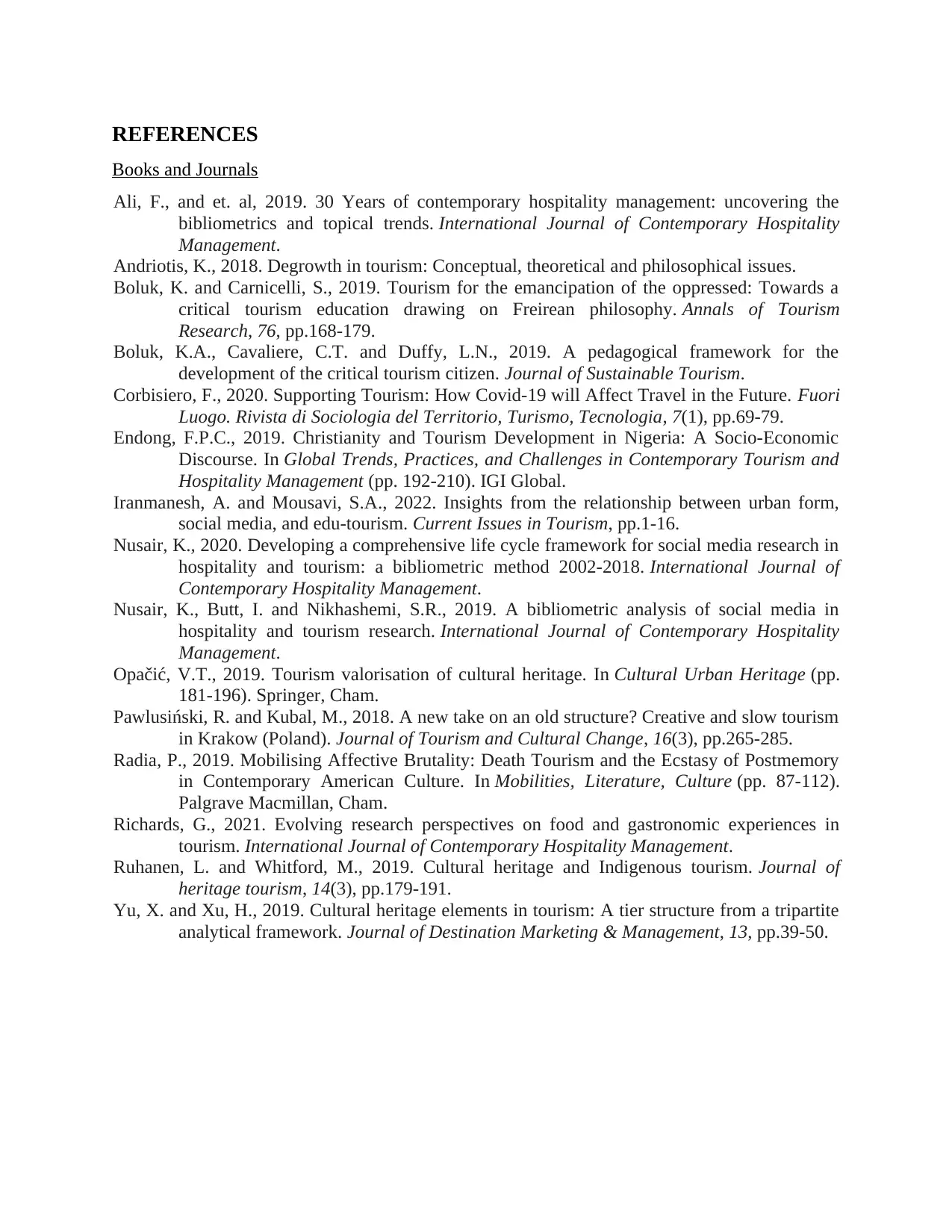
REFERENCES
Books and Journals
Ali, F., and et. al, 2019. 30 Years of contemporary hospitality management: uncovering the
bibliometrics and topical trends. International Journal of Contemporary Hospitality
Management.
Andriotis, K., 2018. Degrowth in tourism: Conceptual, theoretical and philosophical issues.
Boluk, K. and Carnicelli, S., 2019. Tourism for the emancipation of the oppressed: Towards a
critical tourism education drawing on Freirean philosophy. Annals of Tourism
Research, 76, pp.168-179.
Boluk, K.A., Cavaliere, C.T. and Duffy, L.N., 2019. A pedagogical framework for the
development of the critical tourism citizen. Journal of Sustainable Tourism.
Corbisiero, F., 2020. Supporting Tourism: How Covid-19 will Affect Travel in the Future. Fuori
Luogo. Rivista di Sociologia del Territorio, Turismo, Tecnologia, 7(1), pp.69-79.
Endong, F.P.C., 2019. Christianity and Tourism Development in Nigeria: A Socio-Economic
Discourse. In Global Trends, Practices, and Challenges in Contemporary Tourism and
Hospitality Management (pp. 192-210). IGI Global.
Iranmanesh, A. and Mousavi, S.A., 2022. Insights from the relationship between urban form,
social media, and edu-tourism. Current Issues in Tourism, pp.1-16.
Nusair, K., 2020. Developing a comprehensive life cycle framework for social media research in
hospitality and tourism: a bibliometric method 2002-2018. International Journal of
Contemporary Hospitality Management.
Nusair, K., Butt, I. and Nikhashemi, S.R., 2019. A bibliometric analysis of social media in
hospitality and tourism research. International Journal of Contemporary Hospitality
Management.
Opačić, V.T., 2019. Tourism valorisation of cultural heritage. In Cultural Urban Heritage (pp.
181-196). Springer, Cham.
Pawlusiński, R. and Kubal, M., 2018. A new take on an old structure? Creative and slow tourism
in Krakow (Poland). Journal of Tourism and Cultural Change, 16(3), pp.265-285.
Radia, P., 2019. Mobilising Affective Brutality: Death Tourism and the Ecstasy of Postmemory
in Contemporary American Culture. In Mobilities, Literature, Culture (pp. 87-112).
Palgrave Macmillan, Cham.
Richards, G., 2021. Evolving research perspectives on food and gastronomic experiences in
tourism. International Journal of Contemporary Hospitality Management.
Ruhanen, L. and Whitford, M., 2019. Cultural heritage and Indigenous tourism. Journal of
heritage tourism, 14(3), pp.179-191.
Yu, X. and Xu, H., 2019. Cultural heritage elements in tourism: A tier structure from a tripartite
analytical framework. Journal of Destination Marketing & Management, 13, pp.39-50.
Books and Journals
Ali, F., and et. al, 2019. 30 Years of contemporary hospitality management: uncovering the
bibliometrics and topical trends. International Journal of Contemporary Hospitality
Management.
Andriotis, K., 2018. Degrowth in tourism: Conceptual, theoretical and philosophical issues.
Boluk, K. and Carnicelli, S., 2019. Tourism for the emancipation of the oppressed: Towards a
critical tourism education drawing on Freirean philosophy. Annals of Tourism
Research, 76, pp.168-179.
Boluk, K.A., Cavaliere, C.T. and Duffy, L.N., 2019. A pedagogical framework for the
development of the critical tourism citizen. Journal of Sustainable Tourism.
Corbisiero, F., 2020. Supporting Tourism: How Covid-19 will Affect Travel in the Future. Fuori
Luogo. Rivista di Sociologia del Territorio, Turismo, Tecnologia, 7(1), pp.69-79.
Endong, F.P.C., 2019. Christianity and Tourism Development in Nigeria: A Socio-Economic
Discourse. In Global Trends, Practices, and Challenges in Contemporary Tourism and
Hospitality Management (pp. 192-210). IGI Global.
Iranmanesh, A. and Mousavi, S.A., 2022. Insights from the relationship between urban form,
social media, and edu-tourism. Current Issues in Tourism, pp.1-16.
Nusair, K., 2020. Developing a comprehensive life cycle framework for social media research in
hospitality and tourism: a bibliometric method 2002-2018. International Journal of
Contemporary Hospitality Management.
Nusair, K., Butt, I. and Nikhashemi, S.R., 2019. A bibliometric analysis of social media in
hospitality and tourism research. International Journal of Contemporary Hospitality
Management.
Opačić, V.T., 2019. Tourism valorisation of cultural heritage. In Cultural Urban Heritage (pp.
181-196). Springer, Cham.
Pawlusiński, R. and Kubal, M., 2018. A new take on an old structure? Creative and slow tourism
in Krakow (Poland). Journal of Tourism and Cultural Change, 16(3), pp.265-285.
Radia, P., 2019. Mobilising Affective Brutality: Death Tourism and the Ecstasy of Postmemory
in Contemporary American Culture. In Mobilities, Literature, Culture (pp. 87-112).
Palgrave Macmillan, Cham.
Richards, G., 2021. Evolving research perspectives on food and gastronomic experiences in
tourism. International Journal of Contemporary Hospitality Management.
Ruhanen, L. and Whitford, M., 2019. Cultural heritage and Indigenous tourism. Journal of
heritage tourism, 14(3), pp.179-191.
Yu, X. and Xu, H., 2019. Cultural heritage elements in tourism: A tier structure from a tripartite
analytical framework. Journal of Destination Marketing & Management, 13, pp.39-50.
1 out of 7
Related Documents
Your All-in-One AI-Powered Toolkit for Academic Success.
+13062052269
info@desklib.com
Available 24*7 on WhatsApp / Email
![[object Object]](/_next/static/media/star-bottom.7253800d.svg)
Unlock your academic potential
Copyright © 2020–2026 A2Z Services. All Rights Reserved. Developed and managed by ZUCOL.




